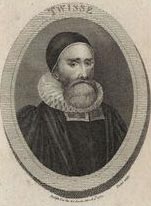
William Twisse
Encyclopedia

Westminster Assembly
The Westminster Assembly of Divines was appointed by the Long Parliament to restructure the Church of England. It also included representatives of religious leaders from Scotland...
, putting him at the head of the churchmen of the Commonwealth. He was described by a Scottish member, Robert Baillie
Robert Baillie
Robert Baillie was a Scottish divine and historical writer.-Life:Baillie was born at Glasgow, the son of Baillie of Jerviston...
, as “very good, beloved of all, and highlie esteemed; but merelie bookish”.
Life
His parents were German. He was educated at Winchester CollegeWinchester College
Winchester College is an independent school for boys in the British public school tradition, situated in Winchester, Hampshire, the former capital of England. It has existed in its present location for over 600 years and claims the longest unbroken history of any school in England...
and New College, Oxford
New College, Oxford
New College is one of the constituent colleges of the University of Oxford in the United Kingdom.- Overview :The College's official name, College of St Mary, is the same as that of the older Oriel College; hence, it has been referred to as the "New College of St Mary", and is now almost always...
.
He was appointed chaplain to Elizabeth of Bohemia
Elizabeth of Bohemia
Elizabeth of Bohemia was the eldest daughter of King James VI and I, King of Scotland, England, Ireland, and Anne of Denmark. As the wife of Frederick V, Elector Palatine, she was Electress Palatine and briefly Queen of Bohemia...
, by her father James I of England
James I of England
James VI and I was King of Scots as James VI from 24 July 1567 and King of England and Ireland as James I from the union of the English and Scottish crowns on 24 March 1603...
, in 1612. This position was short-lived, and he returned to England from Heidelberg
Heidelberg
-Early history:Between 600,000 and 200,000 years ago, "Heidelberg Man" died at nearby Mauer. His jaw bone was discovered in 1907; with scientific dating, his remains were determined to be the earliest evidence of human life in Europe. In the 5th century BC, a Celtic fortress of refuge and place of...
around 1613.
He was then given a living at Newton Longueville. He was involved with Henry Savile in the 1618 edition of the works of Thomas Bradwardine
Thomas Bradwardine
Thomas Bradwardine was an English scholar, scientist, courtier and, very briefly, Archbishop of Canterbury. As a celebrated scholastic philosopher and doctor of theology, he is often called Doctor Profundus, .-Life:He was born either at Hartfield in Sussex or at Chichester, where his family were...
. He was vicar of Newbury from 1620. There he was known as an opponent of William Laud
William Laud
William Laud was Archbishop of Canterbury from 1633 to 1645. One of the High Church Caroline divines, he opposed radical forms of Puritanism...
.
He was buried in Westminster Abbey
Westminster Abbey
The Collegiate Church of St Peter at Westminster, popularly known as Westminster Abbey, is a large, mainly Gothic church, in the City of Westminster, London, United Kingdom, located just to the west of the Palace of Westminster. It is the traditional place of coronation and burial site for English,...
, but exhumed in 1661.
Views
He was a strong defender of a Calvinist, supralapsarian position. In his Vindiciae gratiae of 1632 he attacked Jacobus ArminiusJacobus Arminius
Jacobus Arminius , the Latinized name of the Dutch theologian Jakob Hermanszoon from the Protestant Reformation period, served from 1603 as professor in theology at the University of Leiden...
, and in Dissertatio de scientia media of 1639 adopted certain Dominican
Dominican Order
The Order of Preachers , after the 15th century more commonly known as the Dominican Order or Dominicans, is a Catholic religious order founded by Saint Dominic and approved by Pope Honorius III on 22 December 1216 in France...
arguments, on justification
Justification (theology)
Rising out of the Protestant Reformation, Justification is the chief article of faith describing God's act of declaring or making a sinner righteous through Christ's atoning sacrifice....
. His views were in a minority at the Westminster Assembly.
A premillennialist, he wrote a preface to the 1643 English translation, Key of the Revelation, of Joseph Mede
Joseph Mede
Joseph Mede was an English scholar with a wide range of interests. He was educated at Christ's College, Cambridge, where he became a Fellow from 1613. He is now remembered as a biblical scholar. He was also a naturalist and Egyptologist...
's influential Clavis Apocalyptica. Mede was a friend and correspondent.
Works
- A Discovery of D. Jackson's Vanity (1631) against Thomas Jackson
- Vindiciae Gratiae (Amsterdam, 1632)
- The Riches of Gods Love (1653), with Henry JeanesHenry Jeanes-Life:He was son of Christopher Jeanes of Kingston, Somerset, born at Allansay. He became in 1626 a commoner of New Inn Hall, Oxford, where, according to Anthony Wood, he was known for disputation. He graduated B.A. 3 June 1630, and proceeded M.A...
and John GoodwinJohn GoodwinJohn Goodwin may refer to:*John Goodwin , English preacher and religious writer*John B. Goodwin, Mayor of Atlanta, Georgia in the late 1880s... - An Examination of Mr. Cotton's Analysis of The Ninth Chapter of Romans
- The Five Points of Grace and of Predestination
- Of the Morality of the Fourth Commandment
- A Treatise of Mr. Cotton's Clearing Certaine Doubts Concerning Predestination
- The Doctrine of the Synod of Dort and Arles, Reduced to the Practice (1650)

